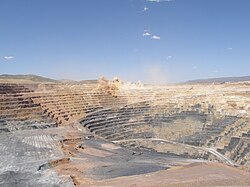
Hollow
Canyon
Canyon
Creeks
Gold mining is a major industry in the U.S. State of Nevada. In 2020 mining overall contributed $9.5 billion to the state's economy, $8.4 billion from gold and silver mining (all silver produced in Nevada is as a by-product from gold mining). Gold production from Nevada was higher than any other U.S. state, 4,632,690 troy ounces (144,090 kg) in 2020 (a decrease of 4.8% on 2019), accounting for 76% of gold produced in the United States and 4.5% of the world's production. The United States ranks fourth, behind China, Australia and Russia. The Nevada mining industry supported an average 15,136 direct employees in 2020, with about 75,000 additional jobs related to providing goods and services needed by the mining industry. [1] [2]
Contents
The following is a list of active gold mines in Nevada.
